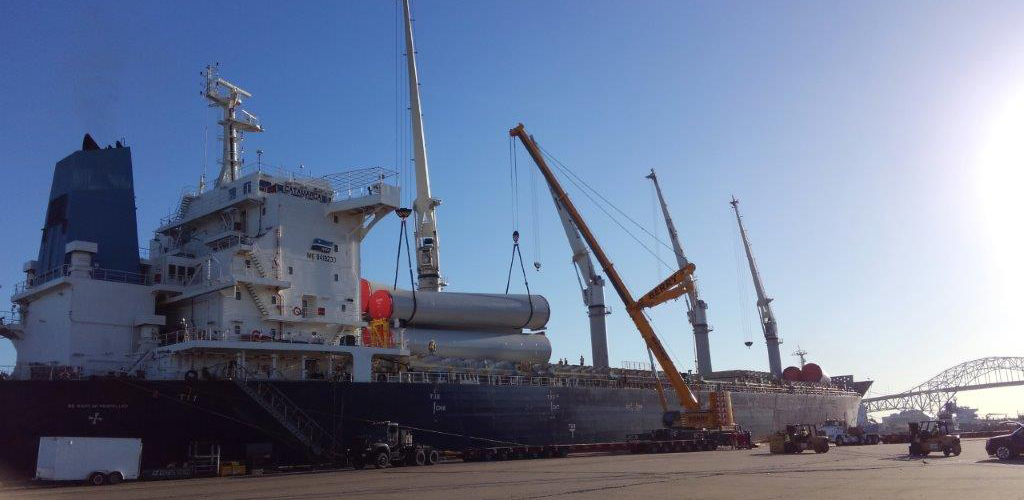
Photo: Cooper/Ports America (C/PA), a Hello Summer photo contest entry.
By Thomas Damsgaard, Founder, Vimar Global Consulting and Breakbulk Veteran
Change starts with changing the conversation, and it is time to change.
Port agents interface with authorities, infrastructure, and relevant stakeholders in the ports, acting as the eyes, ears and hands for the owners and carriers. The agent is the glue which bonds the vessel, crew, ship owner and vessel managers together within the local port infrastructure and cargo operations. Agents are often the only physical touch point between the carrier and their clients, making them critical in the front-line value delivery and client experience.
Meeting increased regulatory demands and accomplishing optimized operations at cost-effective levels during more than 4 million annual port calls (UNCTAD, 2020) and with 5,000 key private/public ports globally (WPC, 2021), represents staggering complexity in the maritime supply chain. Covid-19 taught us that supply chains must be more resilient and agile. The port agent holds an increasing significant role in leading this optimization of the maritime supply and value chain.
A conversation is emerging and bringing to light the need to focus on how we move from transactional service delivery at lowest price to be about reducing complexity, compressing and optimizing time, increasing visibility, improve responsiveness, reducing risk and strengthen compliance across the service areas in a sustainable manner. This represents a significant break from what is considered the traditional port agency scope and role and may be the biggest disruptor for this segment. This shift requires a new level of creative leadership. The question remains whether traditional local and regional agents will acquire the skill and talent accordingly to be able to adapt and transform, or we will see the transformation being led by the few or from outside the segment?
With the volatility, uncertainty, complexity and ambiguity, or WUCA, the agency segment must develop and evolve. This is best achieved with increased transparency, using an open dialogue to address the opportunities and challenges at an industry level. Engaging deeper with vendors and increasing collaboration within the value chain through exploratory and innovative conversations going beyond “just pricing” is key to develop unique new solutions. This is about having the willingness to engage with value chain partners and stakeholders that are servicing the ports and asking questions. Asking questions should not be a sign of not knowing, but instead encouraging the industry to explore new opportunities. Change starts with changing the conversation, and that needs to be changed. The maritime industry is a conservative and change resistant industry. Historically most of the past changes were due to regulatory compliance issues. We have been less than excellent at collaborating across the whole value chain platform and move from compliance motivations to competency building. My recommendation is to engage in conversation with your extended value chain partners and ask questions to find collaborative sustainable solutions.
As the industry adapts and executes its transactional service delivery, the transition to web-based and enterprise software solutions are presenting new opportunities. Taking a page from the travel industry playbook, we can see how the web and digitalization reduced the need for travel agents and how we today book entire vacations direct with the carrier including bundled offerings such as flights, hotels, rental cars etc., all online with an algorithm running the show. I predict port agency interactions will evolve in similar ways.
Major changes ahead
- We are going to witness deep learning and AI supporting the need for smart data and intel. Trade intelligence enables clients to make smarter business decisions around the globe. Agents need to prioritize developing and providing appropriate intelligence platforms, and source value adding intel for this crucial purpose – intel which is not always tied to a specific or typical vessel call. The historical agent/client communications containing transactional ship and port operational data and information is not adequate. Relevant, accurate and timely intel around port and trade data allow clients to respond to markets and make smart decisions. Leverage information and intel, pulling it together in dashboards or compressed formats allows clients to make smarter decisions closer to “in-real-time”. This trend is being addressed by platforms like World of Ports. (link: https://www.worldofports.com)
- In extension of the intel, there is an inclination towards enterprise software integration and web-based solutions. This is taking a cue from some other industries that have moved to IoT solutions with great efficiency and cost reduction benefit for all stakeholders. The industry requirement of “real-time” information is driving the utilization of the digital domain. Information must be made available to be pulled by the clients when they need it in their time zones 24/7 on whichever ever digital device they prefer.
- Current physical documentation handling for port operations and vessel activities are highly inefficient, slow and cost-intensive. With the ever-increasing cost pressure for ports to stay competitive, moving documentation processes into the digital domain is essential. We have already seen technology trends in Europe for digital vessel clearance between ports, and we are hopeful that U.S. Customs and Border Protection and U.S. Coast Guard will adopt similar practices for the U.S.
- Look to the ledger technology like block-chain to play a pivotal role in any transactional process including documentation. To underline this significance, Blockchain has been compared to when maritime moved from sail to steam engine, with the potential to transform the entire industry and trade. Covid-19 is an accelerator in this digital evolution.
- The maritime industry would benefit from increased agility. Within agency this entails enabling scaling and redirect resources in a more agile and nimble manner. Reflecting on how Covid-19 suddenly has affected work, challenging a lot of companies, we can gather inspiration from other industries how an agile framework may be implemented. Early adopters of an agile and nimble model have leveraged digital platforms with performance metrics allowing the flexibility in scaling up and down, driven by demand, redirecting resources to where they are needed. An example is how remote work environments and having company cultures align with people's changing mentality, has proven to have a more positive impact to the point of providing a competitive advantage.
Covid-19 is a pivot point where becoming a true solution partner is more critical than ever before. There is a long overdue need for deeper integrations between all the port vendors and stakeholders. Port calls are complex. Some of this complexity is the nature of the business, but some is by design. Redesigning smarter and more optimized ways of aligned services and delivery must be achieved to reduce the complexity, risk and non-value adding activities while increasing efficiency. This will require change, and I believe that change starts with changing the conversation, and this is where transformative conversations with the wide range of vendors and support companies in the ports must be engaged.
 About the author
About the author
Thomas Damsgaard has 30-plus years of experience in global maritime management and executive leadership including the Clipper Group, Spliethoff Group, SAL, Scan-Trans and most recently at Inchcape North America. He holds an MBA in maritime and logistics from Copenhagen Business School.
"port" - Google News
July 02, 2021 at 10:21AM
https://ift.tt/3AlhUnq
5 Ways to Future-proof Port Agents - www.breakbulk.com - www.breakbulk.com
"port" - Google News
https://ift.tt/2VXul6u
https://ift.tt/2WmIhpL
No comments:
Post a Comment